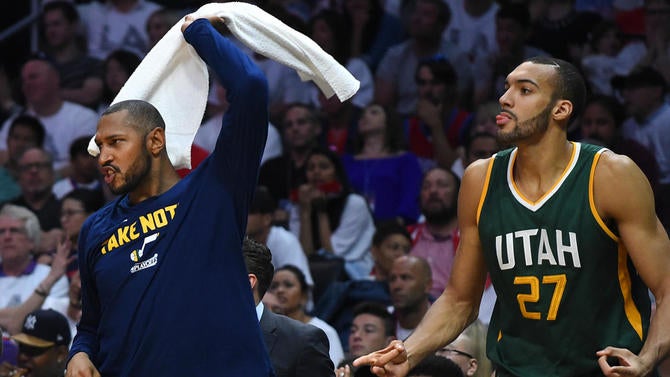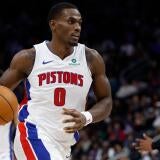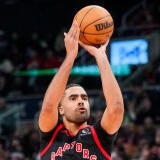NBA Playoffs: Jazz's Game 7 win illustrates Clippers front office's shortcomings
Utah overcame its relative lack of experience with a balanced, deep and versatile roster

Despite their core's lack of playoff experience together, despite them being on the road, the Utah Jazz stormed into Staples Center on Sunday and took Game 7 from the Los Angeles Clippers. The Jazz won 104-91 to advance to the second round, and it was decisive. They did not need Joe Johnson to make heroic plays in crunch time, and the Clippers were not close enough to be able to ask Chris Paul to do so. Los Angeles led for a total of 34 seconds early in the first quarter, and Utah controlled the game no matter who was on the court.
This result will intensify the ongoing conversation about the future of Paul, the injured Blake Griffin and sharpshooter J.J. Redick, all of whom will hit free agency in July. Clippers coach Doc Rivers said that they have been "reading about our obituary for about three months now," but thought the players did a good job of focusing on the season rather than what would come afterward. To sum up the situation succinctly: The Clippers now have to convince those guys that, even though they have yet to get to the conference finals, the front office can put them in a position to get there.
The trouble with that, of course, is that this series against the Jazz illuminated the ways in which that front office has failed.

Less than three minutes into Game 7, Utah center and Defensive Player of the Year candidate Rudy Gobert had to head to the bench because he picked up two early fouls. Every time he re-entered, he picked up another quick foul and had to check out again. Gobert finished with one point and four rebounds in 13 minutes. Just like when he had to miss the first three games of the series, Derrick Favors played admirably in his place. Jazz coach Quin Snyder played 12 players, and six of them scored in double figures. Three backup point guards hit the floor, and Utah is also comfortable using lineups that feature no point guards at all.
"That's basically what we've been this year," Utah coach Quin Snyder said. "Guys have had to be ready. Invariably, they're needed."
In the game and the series, the Clippers had much more trouble making adjustments. They needed Chris Paul to be brilliant, and when the Jazz trapped him, their big men weren't particularly comfortable making plays. Jamal Crawford and Austin Rivers, then, had a ton of pressure on them to create.
All along, Los Angeles was at a disadvantage in terms of depth and versatility. Perhaps Gordon Hayward is a step below Paul in the league's superstar hierarchy, but he had Johnson helping him by drawing double teams and making big shots. Utah's shooters were more consistent throughout, and a lot of that was because of the ball movement and collective basketball IQ that comes with having guys like Boris Diaw and Joe Ingles on the court.
Ingles, in particular, is a sore spot for Los Angeles. He was on the roster in the 2014-15 preseason, but, in a story that has been told all over the place during this series, was cut while his wife was on a plane from Australia to watch him play in the NBA for the first time. The Jazz signed him shortly thereafter.
You already know about the Clippers' other misfires. It's not just that they have not been able to hit a home run in the draft like the Jazz nabbing Gobert at No. 27, it's that they traded a first-round pick in order to get rid of forward Jared Dudley. There was also the disastrous Spencer Hawes signing, followed by the trade of Hawes and Matt Barnes for Lance Stephenson, followed by the trade of Stephenson and a first-round pick for Jeff Green. Los Angeles has desperately tried to surround its core players with veteran reserves, and is largely failed to develop young prospects or find diamonds in the rough. The front office deserves credit for identifying Luc Richard Mbah a Moute as a fit, but it is telling that Brandon Bass, Wesley Johnson and Alan Anderson all spent the entirety of this elimination game on the bench.

All top-heavy teams have this problem, and it requires front-office creativity to solve it. We'll never know what would have happened if Griffin hadn't hurt his toe, but the past few years have brought questions about whether or not the Clippers' Big 3 worked well enough together. Beyond the ever-fascinating "dynamic" between them, are they ideal partners on the court? While their starting five has always had incredible numbers, how would the team look if they had Paul, Jordan, better wings and a stretch 4? Perhaps Griffin should have spent more time playing backup center; perhaps this whole discussion is different if Josh Smith and Corey Brewer hadn't hit a bunch of 3-pointers two years ago.
Utah, though, has a similar issue: It's unclear whether or not Gobert and Favors should be its frontcourt of the future. Lucky for Snyder, there enough multi-positional players on the roster that this didn't particularly matter. The two traditional bigs didn't have to play together at all in the series, and that was fine. They had other options.
Imagine, for example, if the Clippers had Johnson in place of Paul Pierce. They tried to sign him last summer, but the Jazz had more money to offer him and he loved their roster and the role he could play. You wouldn't think of Utah as a more attractive free-agent destination than Los Angeles, but that's where the playoff hero chose to go.
In one big way, these two teams are in similar positions. With Hayward and George Hill heading into free agency, players can determine the outlook of both franchises this summer. But when all of these guys are trying to make their decisions, the Jazz front office can point to their track record and credibly say something the Clippers can't: You should trust us.

















